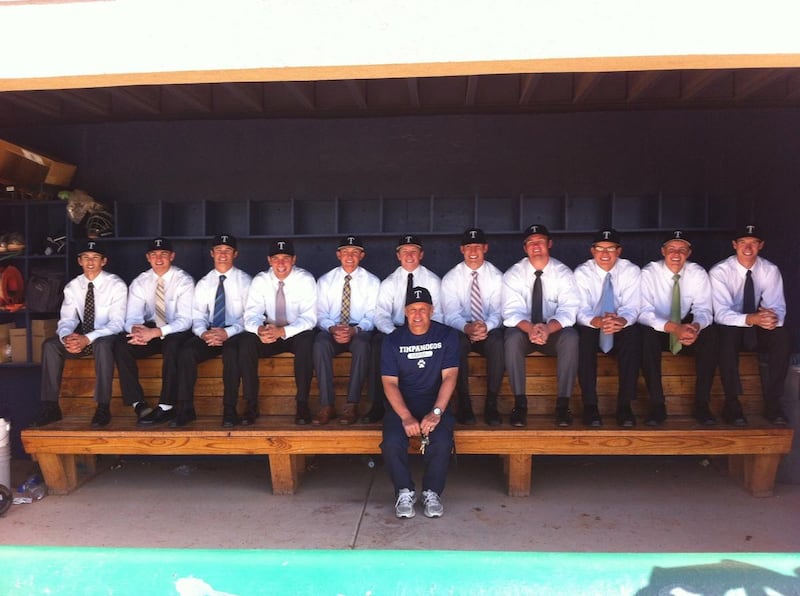His ability to improve lives and inspire is remarkable. – Nick Stewart, who had two sons play for Nelson, including Snow College and Cougar quarterback Christian Stewart
Kim Nelson has mastered the art of coaching. It’s the enterprise of tuning muscle and sinew with timing and strength, elevating intellect and firing up hearts and making them soar.
The standard for any coach is to shape athletes into more of what they could be, and the good ones find ways of carving out exceptional people in the process; victories are just a byproduct.
In north Orem, there remains a buzz about Timpanogos’ 4A state championship run in which Kim Nelson found a way to get his team to climb out of the loser’s bracket and defeat powerful rival Orem back-to-back for the title.
In one of those games, team captain and leading hitter Tanner Evans was in the dugout declaring he would hit a home run. It was a team that refused to die. That homer came on the belief, the faith, confidence and trust hatched and manufactured by Nelson. His leadership has led him to a remarkable 34-year coaching career.
Timpanogos’ 4A title in May was Nelson’s seventh, two at American Fork and fifth with the Timberwolves, who finished 28-4. His overall coaching record is 558-274 (.670), believed to be second to Jon Hoover at 595 (Pleasant Grove and Juan Diego) in state history.
“Seven state championships?” said Glen Tuckett, Nelson’s college coach at BYU. “Can you imagine how out of reach that is for most mortals? To win 558 games? Unbelievable in the few number of times you can play in a single high school season.”
But it isn’t wins that stand out about Nelson. He builds men like Detroit makes cars. He has an aura about him few can explain. He’s quiet, humble and not an exceptional organizer or planner without his wife, but when Nelson walks on an infield and gets to the chalk line, he turns into a magician with a golden touch. Players get elevated.
A former BYU star and a major college football official who had a short career in the minors, Nelson has also taught half the teens in north Orem how to drive. Players seem afraid of him, he seems unapproachable, but he’s not. It’s more that they respect him so much, pay reverence to his position, that they don’t want to let him down. Not ever.
In 2013, most of his seniors accepted LDS mission calls, the culturally expected route for many in a community of the most densely populated Mormon neighborhoods in the world.
“His ability to improve lives and inspire is remarkable,” said Nick Stewart, who had two sons play for Nelson, including Snow College and Cougar quarterback Christian Stewart. “Over time, as a longtime observer, I’ve seen him change the culture at that school with players, from undisciplined, aloof guys to goal-oriented, driven young men. It’s remarkable.”
Virginia football coach Bronco Mendenhall was a catcher on Nelson’s first American Fork title team. To this day, Mendenhall still calls Nelson “Coach.”
Bret Lopez is perhaps Nelson’s most successful Timpanogos player, with a solid career at BYU and now in physician’s assistant school making his first patient rounds. He remembers his junior year after an early personal slump and bad game the team had to run 10 poles — from the left field to right field lines on the warning track. Lopez did double, he was so down on himself for his performance. “I was exhausted and walked to my car when I saw coach Nelson come out of the gym. He was the last guy I wanted to see right then. But he came up and asked me what was wrong.”
Lopez doesn’t remember Nelson’s exact words, but he remembers the impression Nelson left. “He cared more about me than my baseball play. He knew I had talent but needed to love and treasure it, that to play it at a high level, I had to have fun doing it. From that day on, my career took off. I began to enjoy every time at bat and every game, every season. It changed everything for me.”
Lopez said he wasn’t afraid of Nelson. “But because of his persona, we have a profound respect for him in life and that’s what makes him get the most out of his players. He’s taken teams with average talent to state championships.”
Frank Bramall is co-athletic director with Nelson at Timpanogos. He concurs with Lopez.
“I’ve seen him take average players who are freshmen and sophomores and make them good players and I’ve seen him take good players who have become excellent players by the time they are seniors,” said Bramall. “It’s mainly with hitting. I’ve seen him make spot corrections, and it is amazing. He’ll look at a kid's swing, make a suggestion, a tweak and there they go. I’ve tried to learn what he does so I can apply it to softball. The kids seem to understand what he teaches. He always has good hitting teams.”
Bramall said every year Nelson’s seniors, who as sophomores and juniors were in the background messing around, would eventually rise up and take control of the team. It was like a rite of passage, expected.
In the fall, Nelson coaches golf but gives his seniors a workout to do in his absence and they take charge of everything and do it. Whether it’s taking care of the field, rolling up a fence or whatever, it is done. I haven’t seen that with most other sports. If the coach isn’t right there, they’re goofing off, even if there is a sub there, but that doesn’t happen in baseball.”
Bramall says if any baseball players ever act up in his class, he tells them he’s going to send them to coach Nelson. “Their wagon gets fixed immediately. They don’t want to disappoint him.”
Nelson met his wife Leslie Winebrenner while at BYU and they married in August 1979. They have eight children and 12 grandchildren. Kim’s brothers Dave and Clyde were BYU baseball stars in the ’70s. Dave, who died from complications following a liver transplant, was a successful baseball coach at Utah Valley University when a two-year junior college. Clyde was a successful basketball coach at Ricks College.
Leslie is known around Timpangos as the GM of the team.
Said Tuckett, who spoke at the funeral of Kim and Leslie’s infant child who died of SIDs, “I’ve known the Nelson family it seems forever and one of the reasons Dave, Kim and Clyde and their sisters are such great people is because of their parents. In all the years I coached in high school and college I never had a more supportive and less intrusive mother and father than Kim Nelson’s parents. They were great and supported their children in everything.
“I told Kim when he got to BYU, unless I’d made a mistake, he’d be the best third baseman I’d ever have. I got to coach him for two years and he turned out to be a tremendous player.
“Kim has been able to mix discipline with love in the proper amounts that have been a winning formula. It’s been a great pleasure for me to sit back and watch how well he’s done his job. Another reason for his great success is Leslie, his wife. Always supporting, there all the time, great ideas for parties and entertaining and taking care of players and their parents. It has been a productive marriage in every way, and much of Kim’s success must be spread out to her and their children.”
Stewart appreciates Nelson’s involvement in the lives of his sons outside of baseball. “I have personally seen him attend the missionary farewells of 50 of his former players, including both of my sons.”
You’d have to look hard to find a player who has heard Nelson swear. He doesn’t tolerate it in his players, either. Working in a realm where some coaches yell, scream, demean and cuss, this isn’t a Nelson mode of operation.
Said Chris Evans, father of Tanner, “I hear stories from parents of other programs who have coaches around the valley who swear and are right there telling dirty jokes with players. He cares more about developing them as young men than as baseball players, that they hold themselves to a higher standard as Timpanogos players.”
His wife, Angie Evans, says other than family, no other person has had more impact on her son than Kim Nelson.
“He’s never demanded respect from his players; he simply expects it and they give it freely. He has taught them to be exceptional baseball players but shown them to be even better young men.”
Tanner says the thing that stands out about Nelson is respect. “The respect not only his players but other players and umpires have for him.”
Some say coaching is an art form. Others say it’s a passage of cronyism and an old boys club. Most will tell you it is a labor of love at the high school level, where coaches donate time, energy and many resources.
For Nelson, it has proven to be much more: A successful industry, the making of players who know how to be men by a figurehead who has never asked for credit from anybody.
Well done, Mr. Nelson. May we always call you Coach.
EMAIL: dharmon@deseretnews.com.
TWITTER: Harmonwrites




